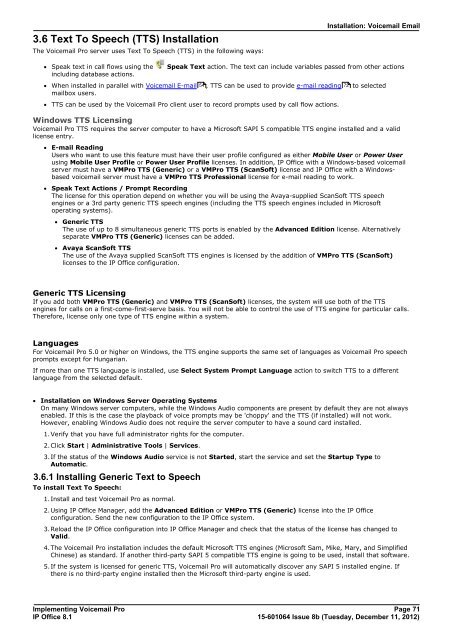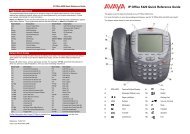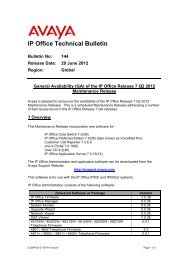Voicemail Pro installation - IP Office Info
Voicemail Pro installation - IP Office Info
Voicemail Pro installation - IP Office Info
You also want an ePaper? Increase the reach of your titles
YUMPU automatically turns print PDFs into web optimized ePapers that Google loves.
3.6 Text To Speech (TTS) Installation<br />
The <strong>Voicemail</strong> <strong>Pro</strong> server uses Text To Speech (TTS) in the following ways:<br />
Installation: <strong>Voicemail</strong> Email<br />
· Speak text in call flows using the Speak Text action. The text can include variables passed from other actions<br />
including database actions.<br />
· When installed in parallel with <strong>Voicemail</strong> E-mail 54 , TTS can be used to provide e-mail reading 72<br />
to selected<br />
mailbox users.<br />
· TTS can be used by the <strong>Voicemail</strong> <strong>Pro</strong> client user to record prompts used by call flow actions.<br />
Windows TTS Licensing<br />
<strong>Voicemail</strong> <strong>Pro</strong> TTS requires the server computer to have a Microsoft SAPI 5 compatible TTS engine installed and a valid<br />
license entry.<br />
· E-mail Reading<br />
Users who want to use this feature must have their user profile configured as either Mobile User or Power User<br />
using Mobile User <strong>Pro</strong>file or Power User <strong>Pro</strong>file licenses. In addition, <strong>IP</strong> <strong>Office</strong> with a Windows-based voicemail<br />
server must have a VM<strong>Pro</strong> TTS (Generic) or a VM<strong>Pro</strong> TTS (ScanSoft) license and <strong>IP</strong> <strong>Office</strong> with a Windowsbased<br />
voicemail server must have a VM<strong>Pro</strong> TTS <strong>Pro</strong>fessional license for e-mail reading to work.<br />
· Speak Text Actions / <strong>Pro</strong>mpt Recording<br />
The license for this operation depend on whether you will be using the Avaya-supplied ScanSoft TTS speech<br />
engines or a 3rd party generic TTS speech engines (including the TTS speech engines included in Microsoft<br />
operating systems).<br />
· Generic TTS<br />
The use of up to 8 simultaneous generic TTS ports is enabled by the Advanced Edition license. Alternatively<br />
separate VM<strong>Pro</strong> TTS (Generic) licenses can be added.<br />
· Avaya ScanSoft TTS<br />
The use of the Avaya supplied ScanSoft TTS engines is licensed by the addition of VM<strong>Pro</strong> TTS (ScanSoft)<br />
licenses to the <strong>IP</strong> <strong>Office</strong> configuration.<br />
Generic TTS Licensing<br />
If you add both VM<strong>Pro</strong> TTS (Generic) and VM<strong>Pro</strong> TTS (ScanSoft) licenses, the system will use both of the TTS<br />
engines for calls on a first-come-first-serve basis. You will not be able to control the use of TTS engine for particular calls.<br />
Therefore, license only one type of TTS engine within a system.<br />
Languages<br />
For <strong>Voicemail</strong> <strong>Pro</strong> 5.0 or higher on Windows, the TTS engine supports the same set of languages as <strong>Voicemail</strong> <strong>Pro</strong> speech<br />
prompts except for Hungarian.<br />
If more than one TTS language is installed, use Select System <strong>Pro</strong>mpt Language action to switch TTS to a different<br />
language from the selected default.<br />
· Installation on Windows Server Operating Systems<br />
On many Windows server computers, while the Windows Audio components are present by default they are not always<br />
enabled. If this is the case the playback of voice prompts may be 'choppy' and the TTS (if installed) will not work.<br />
However, enabling Windows Audio does not require the server computer to have a sound card installed.<br />
1.Verify that you have full administrator rights for the computer.<br />
2.Click Start | Administrative Tools | Services.<br />
3.If the status of the Windows Audio service is not Started, start the service and set the Startup Type to<br />
Automatic.<br />
3.6.1 Installing Generic Text to Speech<br />
To install Text To Speech:<br />
1.Install and test <strong>Voicemail</strong> <strong>Pro</strong> as normal.<br />
2.Using <strong>IP</strong> <strong>Office</strong> Manager, add the Advanced Edition or VM<strong>Pro</strong> TTS (Generic) license into the <strong>IP</strong> <strong>Office</strong><br />
configuration. Send the new configuration to the <strong>IP</strong> <strong>Office</strong> system.<br />
3.Reload the <strong>IP</strong> <strong>Office</strong> configuration into <strong>IP</strong> <strong>Office</strong> Manager and check that the status of the license has changed to<br />
Valid.<br />
4.The <strong>Voicemail</strong> <strong>Pro</strong> <strong>installation</strong> includes the default Microsoft TTS engines (Microsoft Sam, Mike, Mary, and Simplified<br />
Chinese) as standard. If another third-party SAPI 5 compatible TTS engine is going to be used, install that software.<br />
5.If the system is licensed for generic TTS, <strong>Voicemail</strong> <strong>Pro</strong> will automatically discover any SAPI 5 installed engine. If<br />
there is no third-party engine installed then the Microsoft third-party engine is used.<br />
Implementing <strong>Voicemail</strong> <strong>Pro</strong> Page 71<br />
<strong>IP</strong> <strong>Office</strong> 8.1<br />
15-601064 Issue 8b (Tuesday, December 11, 2012)






